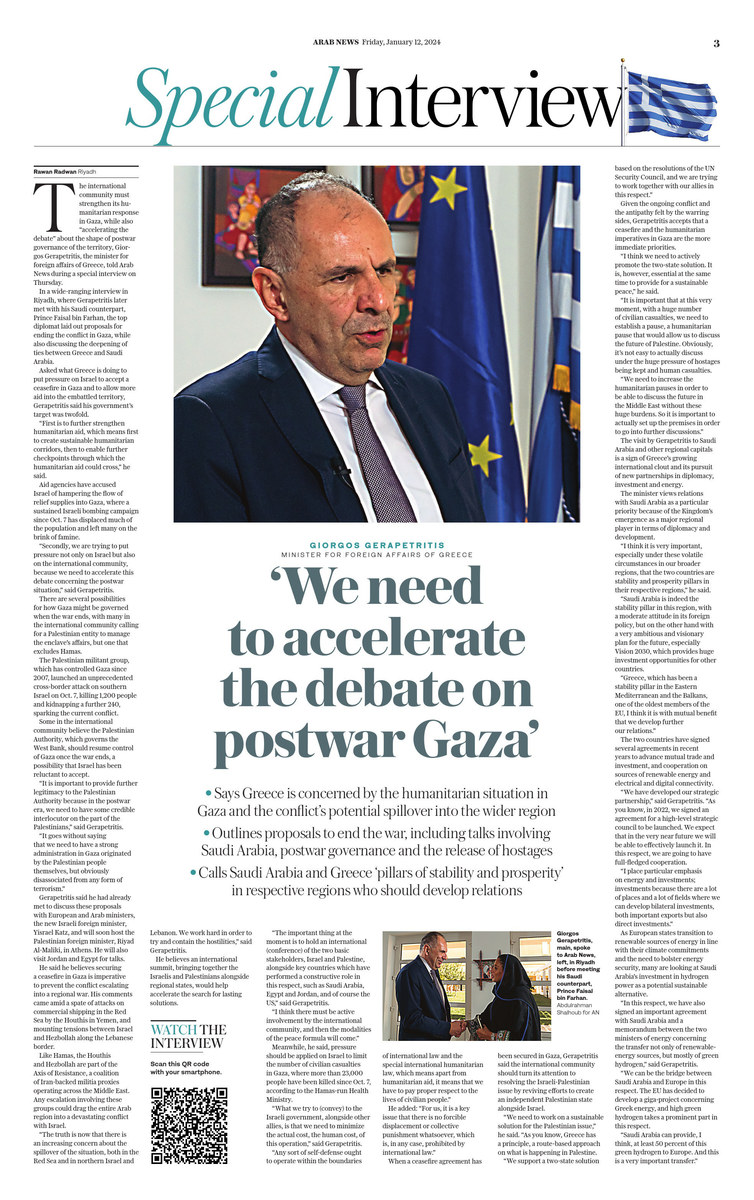RIYADH: The international community must strengthen its humanitarian response in Gaza, while also “accelerating the debate” about the shape of postwar governance of the territory, Giorgos Gerapetritis, the minister for foreign affairs of Greece, told Arab News during a special interview on Thursday.
In a wide-ranging interview in Riyadh, where Gerapetritis later met with his Saudi counterpart, Prince Faisal bin Farhan, the top diplomat laid out proposals for ending the conflict in Gaza, while also discussing the deepening of ties between Greece and Saudi Arabia.
Asked what Greece is doing to put pressure on Israel to accept a ceasefire in Gaza and to allow more aid into the embattled territory, Gerapetritis said his government’s target was twofold.
“First is to further strengthen humanitarian aid, which means first to create sustainable humanitarian corridors, then to enable further checkpoints through which the humanitarian aid could cross,” he said.
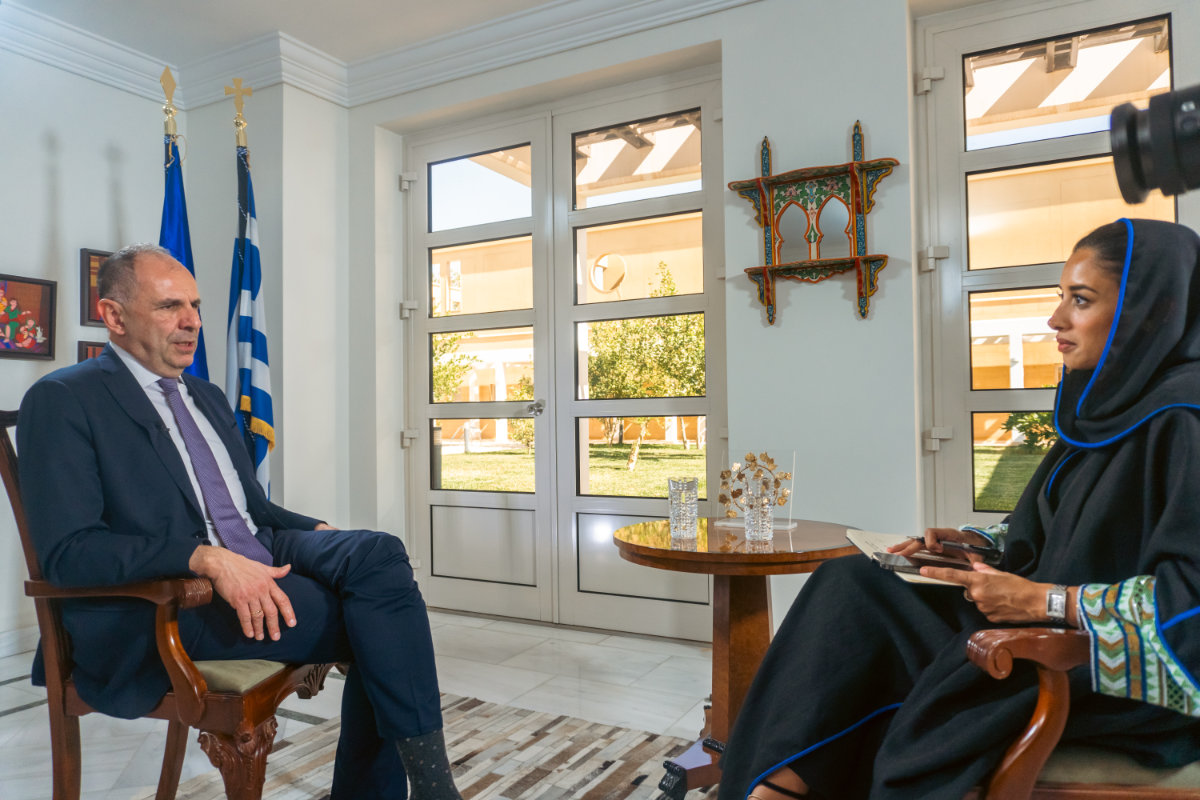
Greek FM Giorgos Gerapetritis, left, spoke to Arab News in Riyadh before meeting his Saudi counterpart, Prince Faisal bin Farhan. (Abdulrahman Shalhoub for AN)
Aid agencies have accused Israel of hampering the flow of relief supplies into Gaza, where a sustained Israeli bombing campaign since Oct. 7 has displaced much of the population and left many on the brink of famine.
“Secondly, we are trying to put pressure not only on Israel but also on the international community, because we need to accelerate this debate concerning the postwar situation,” said Gerapetritis.
There are several possibilities for how Gaza might be governed when the war ends, with many in the international community calling for a Palestinian entity to manage the enclave’s affairs, but one that excludes Hamas.
The Palestinian militant group, which has controlled Gaza since 2007, launched an unprecedented cross-border attack on southern Israel on Oct. 7, killing 1,200 people and kidnapping a further 240, sparking the current conflict.
Some in the international community believe the Palestinian Authority, which governs the West Bank, should resume control of Gaza once the war ends, a possibility that Israel has been reluctant to accept.
“It is important to provide further legitimacy to the Palestinian Authority because in the postwar era, we need to have some credible interlocutor on the part of the Palestinians,” said Gerapetritis.
“It goes without saying that we need to have a strong administration in Gaza originated by the Palestinian people themselves, but obviously disassociated from any form of terrorism.”
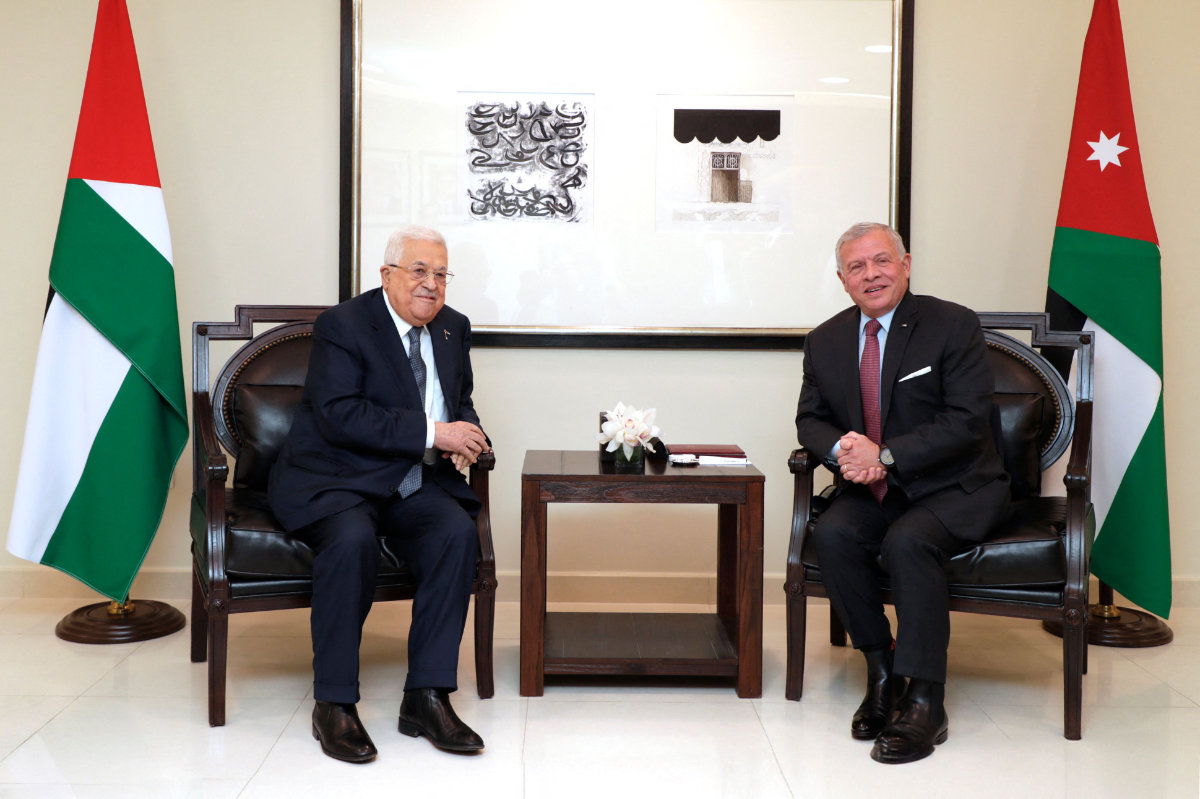
Palestinian Authority president Mahmud Abbas (L) meeting with Jordan's King Abdullah II in Aqaba on January 10, 2024. (Jordanian Royal Palace photo via AFP)
Gerapetritis said he had already met to discuss these proposals with European and Arab ministers, the new Israeli foreign minister, Yisrael Katz, and will soon host the Palestinian foreign minister, Riyad Al-Maliki, in Athens. He will also visit Jordan and Egypt for talks.
He said he believes securing a ceasefire in Gaza is imperative to prevent the conflict escalating into a regional war. His comments came amid a spate of attacks on commercial shipping in the Red Sea by the Houthis in Yemen, and mounting tensions between Israel and Hezbollah along the Lebanese border.
Like Hamas, the Houthis and Hezbollah are part of the Axis of Resistance, a coalition of Iran-backed militia proxies operating across the Middle East. Any escalation involving these groups could drag the entire Arab region into a devastating conflict with Israel.
“The truth is now that there is an increasing concern about the spillover of the situation, both in the Red Sea and in northern Israel and Lebanon. We work hard in order to try and contain the hostilities,” said Gerapetritis.
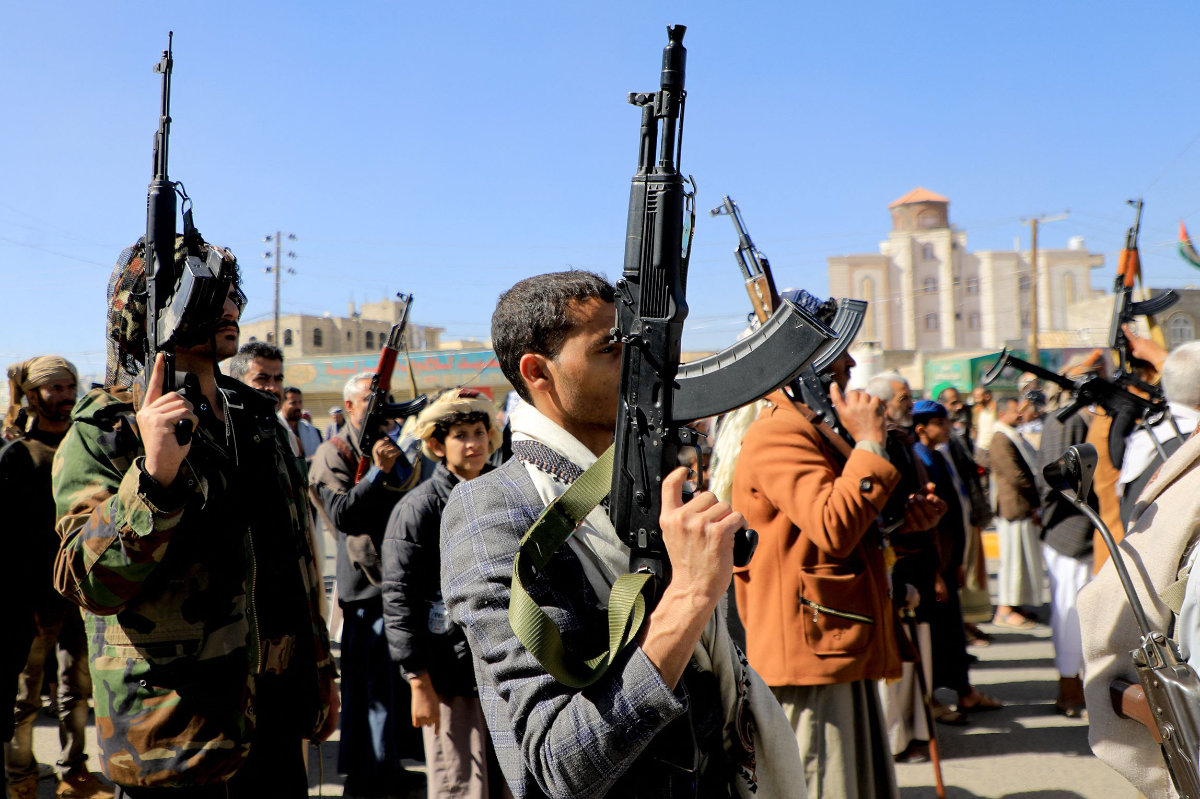
Houthi fighters brandish their weapons during a march in solidarity with the Palestinian people in the Houthi-controlled capital Sanaa on January 11, 2024, amid the ongoing battles between Israel and the militant Hamas group in Gaza.(AFP)
He believes an international summit, bringing together the Israelis and Palestinians alongside regional states, would help accelerate the search for lasting solutions.
“The important thing at the moment is to hold an international (conference) of the two basic stakeholders, Israel and Palestine, alongside key countries which have performed a constructive role in this respect, such as Saudi Arabia, Egypt and Jordan, and of course the US,” said Gerapetritis.
“I think there must be active involvement by the international community, and then the modalities of the peace formula will come.”
Meanwhile, he said, pressure should be applied on Israel to limit the number of civilian casualties in Gaza, where more than 23,000 people have been killed since Oct. 7, according to the Hamas-run health ministry.
“What we try to (convey) to the Israeli government, alongside other allies, is that we need to minimize the actual cost, the human cost, of this operation,” said Gerapetritis.
“Any sort of self-defense ought to operate within the boundaries of international law and the special international humanitarian law, which means apart from humanitarian aid, it means that we have to pay proper respect to the lives of civilian people.”
He added: “For us, it is a key issue that there is no forcible displacement or collective punishment whatsoever, which is, in any case, prohibited by international law.”
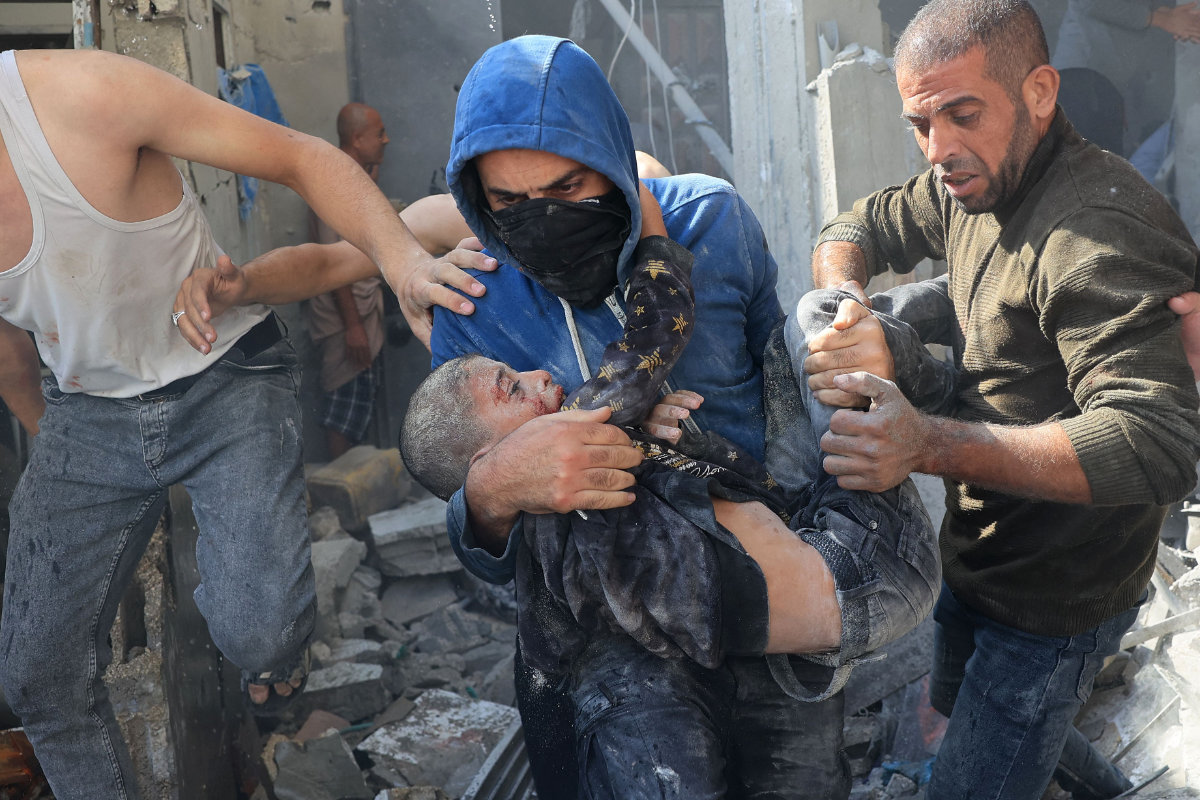
A Palestinian man carries a victim of an Israeli bombardment in Rafah in the southern Gaza Strip on November 7, 2023. Bombed-out neighbourhoods, mass graves dug in the sand, spreading hunger and disease — as the bloodiest ever Gaza war nears 100 days, besieged Palestinians have endured ever new horrors. (AFP)
When a ceasefire agreement has been secured in Gaza, Gerapetritis said the international community should turn its attention to resolving the Israeli-Palestinian issue by reviving efforts to create an independent Palestinian state alongside Israel.
“We need to work on a sustainable solution for the Palestinian issue,” he said. “As you know, Greece has a principle, a route-based approach on what is happening in Palestine.
“We support a two state solution based on the resolutions of the UN Security Council, and we are trying to work together with our allies in this respect.”
Given the ongoing conflict and the antipathy felt by the warring sides, Gerapetritis accepts that a ceasefire and the humanitarian imperatives in Gaza are the more immediate priorities.
“I think we need to actively promote the two-state solution. It is, however, essential at the same time to provide for a sustainable peace,” he said.
“It is important that at this very moment, with a huge number of civilian casualties, we need to establish a pause, a humanitarian pause that would allow us to discuss the future of Palestine. Obviously, it’s not easy to actually discuss under the huge pressure of hostages being kept and human casualties.
“We need to increase the humanitarian pauses in order to be able to discuss the future in the Middle East without these huge burdens. So it is important to actually set up the premises in order to go into further discussions.”
The visit by Gerapetritis to Saudi Arabia and other regional capitals is a sign of Greece’s growing international clout and its pursuit of new partnerships in diplomacy, investment and energy.
The minister views relations with Saudi Arabia as a particular priority because of the Kingdom’s emergence as a major regional player in terms of diplomacy and development.
“I think it is very important, especially under these volatile circumstances in our broader regions, that the two countries are stability and prosperity pillars in their respective regions,” he said.
“Saudi Arabia is indeed the stability pillar in this region, with a moderate attitude in its foreign policy, but on the other hand with a very ambitious and visionary plan for the future, especially Vision 2030, which provides huge investment opportunities for other countries.
“Greece, which has been a stability pillar in the Eastern Mediterranean and the Balkans, one of the oldest members of the EU, I think it is with mutual benefit that we develop further our relations.”
The two countries have signed several agreements in recent years to advance mutual trade and investment, and cooperation on sources of renewable energy and electrical and digital connectivity.
“We have developed our strategic partnership,” said Gerapetritis. “As you know, in 2022, we signed an agreement for a high-level strategic council to be launched. We expect that in the very near future we will be able to effectively launch it. In this respect, we are going to have full-fledged cooperation.
“I place particular emphasis on energy and investments; investments because there are a lot of places and a lot of fields where we can develop bilateral investments, both important exports but also direct investments.”
As European states transition to renewable sources of energy in line with their climate commitments and the need to bolster energy security, many are looking at Saudi Arabia’s investment in hydrogen power as a potential sustainable alternative.
READ MORE: Saudi green hydrogen production costs could be lowest in the world: KAPSARC
“In this respect, we have also signed an important agreement with Saudi Arabia and a memorandum between the two ministers of energy concerning the transfer not only of renewable-energy sources, but mostly of green hydrogen,” said Gerapetritis.
“We can be the bridge between Saudi Arabia and Europe in this respect. The EU has decided to develop a gigaproject concerning Greek energy, and high green hydrogen takes a prominent part in this respect.
“Saudi Arabia can provide, I think, at least 50 percent of this green hydrogen to Europe. And this is a very important transfer.”
